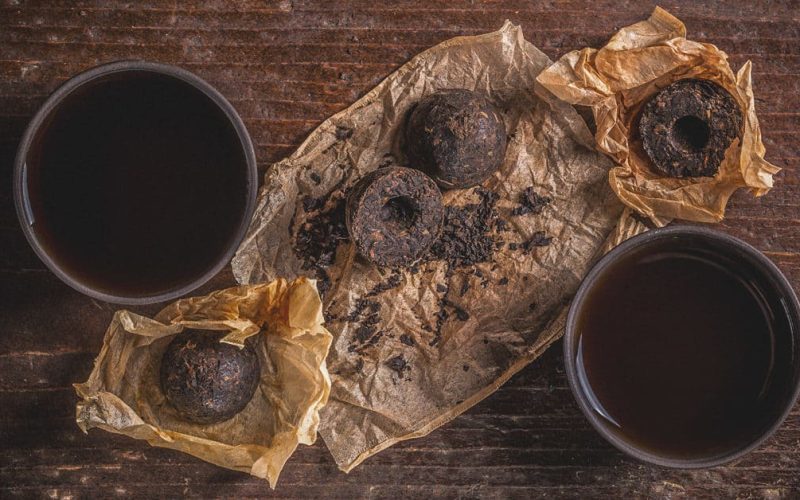Pu-erh tea is a distinctive type of fermented tea that is typically made in China’s Yunnan Province.
It is extracted from the leaves of a tree that grows in the area, identified as the “wild old tree.” While there are other forms of fermented tea like kombucha, Pu-erh tea is different since the leaves themselves are fermented instead of the brewed tea.
Pu-erh is commonly packaged in compressed tea leaf “cakes,” but may also be sold as loose tea. Many individuals drink Pu-erh tea because it doesn’t only offers the nutritional benefits of tea, but also those of fermented food.
Advantages and uses
Below are a handful of benefits of Pu-erh tea:
May encourage weight loss
There is some scant evidence supporting the weight loss use of Pu-erh tea. Studies in animals and test tubes have shown that Pu-erh tea can effectively synthesize less new fats while burning more accumulated body fat, leading to weight loss. Yet, given the absence of human studies on the subject, further research is required.
In addition, Pu-erh tea is distilled, so it can also introduce safe probiotics into the body, or helpful gut bacteria. These probiotics will help boost blood sugar regulation, which plays a crucial role in weight control and starvation.
A single study of 36 overweight individuals found that consuming 333 mg of Pu-erh tea extract three times daily for 12 weeks resulted in substantially improved body weight, body mass index (BMI) and measurements of abdominal fat relative to the control group.
Although this study does not show that you can help lose weight by drinking Pu-erh tea. These studies employed extremely concentrated extracts that contained far higher doses of the active ingredients of Pu-erh tea than those you would get from consuming it.
Enhances cholesterol levels
Several animal studies have shown that fat blood levels are advantageous when combined with Pu-erh tea extracts.
Extracts of Pu-erh tea can help lower cholesterol levels in two ways:
- Pu-erh tea boosts the amount of dietary-fat-bound bile acid excreted in the urine, thus preventing the absorption of fat into the bloodstream
- Pu-erh tea also reduces fat buildup in animal studies. These results together can reduce the risk of heart disease
However, experiments in animals using distilled extracts do not show that drinking Pu-erh tea in humans would have the same effects.
Prevent the growth of cancer
In test-tube tests, breast cancer, oral cancer, and colon cancer cells were destroyed by Pu-erh tea extracts. These results provide a positive starting point for future studies, but Pu-erh tea shouldn’t be seen as a cancer treatment.
These experiments include directly adding highly concentrated extracts to cancer cells, which is how consuming Pu-erh tea can interact with your body’s cancer cells. More research needs to be done to understand better how consuming Pu-erh tea can influence cancer cells.
Can increase liver health
Pu-erh tea can assist in preventing or reverse non-alcoholic fatty liver disease, a disease in which excess body fat builds up in your liver since it can greatly reduce fat accumulation. Nonetheless, this has only been observed so far in animal science.
Another animal researchers also concluded that the extract of Pu-erh tea could protect the liver from damage caused by cisplatin, a chemotherapy drug.
This is a promising field of study, but before any conclusions about Pu-erh tea and liver function can be drawn, human studies are required.
Side effects and safety measures
The majority of Pu-erh tea’s adverse effects stem from its caffeine content. Pu-erh tea can contain 30 – 100 mg of caffeine each cup, based on the quality of the brew.
About 400 mg of caffeine regularly can be tolerated by most people, but some of the harmful effects of excessive caffeine may include:
- Sleeplessness
- Dizziness
- Trembling
- Changes in the rhythm of the heart
- Dehydration
- Diarrhoea or excessive urination
Since fermented foods can influence the concentrations of your gut bacteria, Pu-erh tea can also affect your digestion and likely cause some digestive upset.
Dosage and how it should be brewed
Most individuals can safely consume about 3 cups (710 mL) of Pu-erh tea per day unless they also consume significant amounts of other caffeinated beverages.
There is a lack of research into how much Pu-erh tea you can drink daily to enjoy its possible benefits for weight loss, but a decent starting point is 1 – 2 cups (240-480 mL) per day.
How to brew tea Pu-erh
What you need
- Pu-erh tea: single cake or 3-4 grams of loose leaf tea per cup that you intend to make
- Boiling water
- A teapot with a strainer
- Mugs or teacups
- Optional add-ons such as cream, milk, or sweetener
Steps
- Put the Pu-erh tea cake or loose leaves in a teapot and add only sufficient boiling water to cover the leaves, then drain the water. Repeat this step, making sure to discard the water. Rinsing helps to guarantee a tea of high quality.
- Fill the teapot with boiling water and give 2 minutes for the tea to simmer. You can stay for a longer or shorter time, depending on your taste preferences.
- Pour the tea into teacups and add extras if needed.
Stopping and withdrawal
You should have no trouble stopping Pu-erh tea, and you should not have any withdrawal effects unless you absolutely cut out caffeine.
Nevertheless, if Pu-erh tea is the only source of caffeine you have consumed, you can develop some withdrawal symptoms of caffeine, including exhaustion, headaches, and difficulty concentrating. Most signs of caffeine withdrawal last for around one week.
Overdose
An overdose of Pu-erh tea is unlikely, but it includes caffeine. If you consume many cups per day combined with other caffeinated drinks, there is some chance of an overdose of caffeine.
Symptoms of caffeine overdose, such as erratic heartbeat, may start after consuming 400 mg of caffeine, which, depending on the intensity of the brew, is equal to 4 or more cups (950 mL) of Pu-erh tea.
There is little chance of overdose in one or two cups (240 – 480 mL) of Pu-erh tea.
Interactions
Pu-erh tea is generally safe, and its caffeine content is the cause of most drug interactions. Antibiotics, certain stimulants, some heart medicines, and some asthma medications are some of the drugs that may interfere with caffeine.
You can contact your healthcare provider if you have any questions about your caffeine consumption and your drugs.
Handling and storage
Pu-erh tea is a fermented product that continues to grow in quality as it ages, so it lasts almost forever if properly stored. Keep the Pu-erh tea cakes in an airtight jar in a cool, dark place like your pantry. You should throw it out if it smells or looks strange, or there’s obvious mould growing on it.
Breastfeeding and Pregnancy
The main problem with Pu-erh tea during pregnancy or breastfeeding is caffeine. Even though pregnant women may not have to remove caffeine from their diet entirely, they should not overdo it. During pregnancy, doctors suggest no more than 200 mg of caffeine a day.
Since Pu-erh tea can have up to 100 mg per cup (240 mL), it can be moderately added to the diet of a pregnant woman as long as she does not eat any other drinks that are rich in caffeine daily.
Women who are breastfeeding should also restrict their caffeine consumption to approximately 300 mg a day as small amounts of caffeine may pass into breast milk.
Application in specific categories
Pu-erh tea for particular populations does not seem to have any potential side effects. Like other teas, Pu-erh tea should be avoided if it seems to annoy you. You should also not drink it in abundance, due to its caffeine content.
People may want to avoid excessive caffeine if they have sleep disorders, migraines, heart attacks, high blood pressure, gastroesophageal reflux disease (GERD), or ulcers. Regardless, 1 – 2 cups (240-480 mL) a day should be okay for most individuals.
Alternatives
Pu-erh is exceptional in the tea world. Black tea may be its closest substitute as far as brewed teas go. Black tea, evident in its dark colour, is oxidized but not fermented to the same degree as Pu-erh tea.
You can also try kombucha, a fermented tea that contains the same benefits as fermented foods. It can be produced from any tea, and the liquid is distilled as opposed to the leaves, as in the case of Pu-erh tea.
Frequently asked questions
What does Pu-erh tea taste like?
Pu-erh tea has a distinct spicy or “funky” taste owing to the fermentation process, but this is combined with other flavours, like sweetness, bitterness and earthiness. Pu-erh teas can have flavours with other ingredients. Additionally, as the tea begins to mature, the flavour improves.
What’s raw Pu-erh tea?
There are two varieties of Pu-erh tea, which include:
Ripe Pu-erh tea
The least expensive type is ripe Pu-erh tea. This tea is produced for several months by fermenting the loose leaves and then pressing them into form.
Raw Pu-erh tea
Raw Pu-erh tea is more costly. The measures for making ripe Pu-erh are reversed in order to make raw Pu-erh. The fresh tea leaves are pressed and then fermented, usually for years.
What are some common flavours of Pu-erh tea?
Pu-erh tea is a common choice for tea and is often flavored with other tastes. Chocolate Pu-erh tea, which contains cocoa powder, and chrysanthemum Pu-erh, which includes the dried petals of the chrysanthemum flower, are common blends.
These additions will make the taste of Pu-erh tea even better, as it has a unique taste not liked by all.
How many calories does Pu-erh tea contain?
Fermented teas are generally calorie-free or exceptionally low in calories, like Pu-erh tea. Nonetheless, adding sugar or cream can boost your tea’s calorie count.
Can you consume Pu-erh tea on a regular basis?
Yes, as long as you handle it well, there is no harm in consuming Pu-erh tea regularly.





